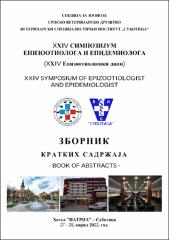Značaj mikrobioma u organizmu čoveka i njegov uticaj na zdravlje domaćina - primeri uloge mikrobioma kod kovida-19

View/
Date
2022-04-27Author
Šekler, Milanko
Vidanović, Dejan
Tešović, Bojana
Petrović, Tamaš
Debeljak, Zoran
Vasković, Nikola
Dmitrić, Marko
Matović, Kazimir
Lazić, Sava
Metadata
Show full item recordAbstract
The human micro – world of microorganisms is defined as the microbiota living in or
on the human body in symbiotic or parasitic relationships, including about 1.5 – 3 kg
of microbes. The microbiot include bacteria, fungi, viruses, protozoa and archaeal
populations.
Regarding to the distribution of microbes in humans, they are classified as intestinal
micro-ecosystems, oral micro-ecosystems, skin micro-ecosystems, vaginal microecosystems
and so on. Microbiota (by their metabolites) influence on human
physiology both in health and disease by participating in digestion and nutrition,
contributing to metabolic functions, modulating the immune system, synthesizing
vitamins, neurotransmiters and producing a wide variety of biochemically active
compounds.
The main aim and the tasks of this paper is to show current situation and potential
influence of microbiome on future development on human and veterinary medicine,
and to emphasize on significance of the application of new methods which use the
concept of massively parallel processing, it is also called next-generation sequencing
(NGS) or second-generation sequencing.
In last years, the relationship between microbiome and humans diseases has been
studied extensively. For example, the gut microbiome has some kind of feedback
relation with next human diseases: obesity, diabetes, autoimmune hepatitis, liver
cirrhosis, hepatocellular carcinoma, chronic kidney diseases and autism.
In last time, there are large numbers studies on COVID-19 which suggested that the
characteristics of microbiome also plays an important role in COVID – 19 how will
be severe clinical shape of COVID – 19.
